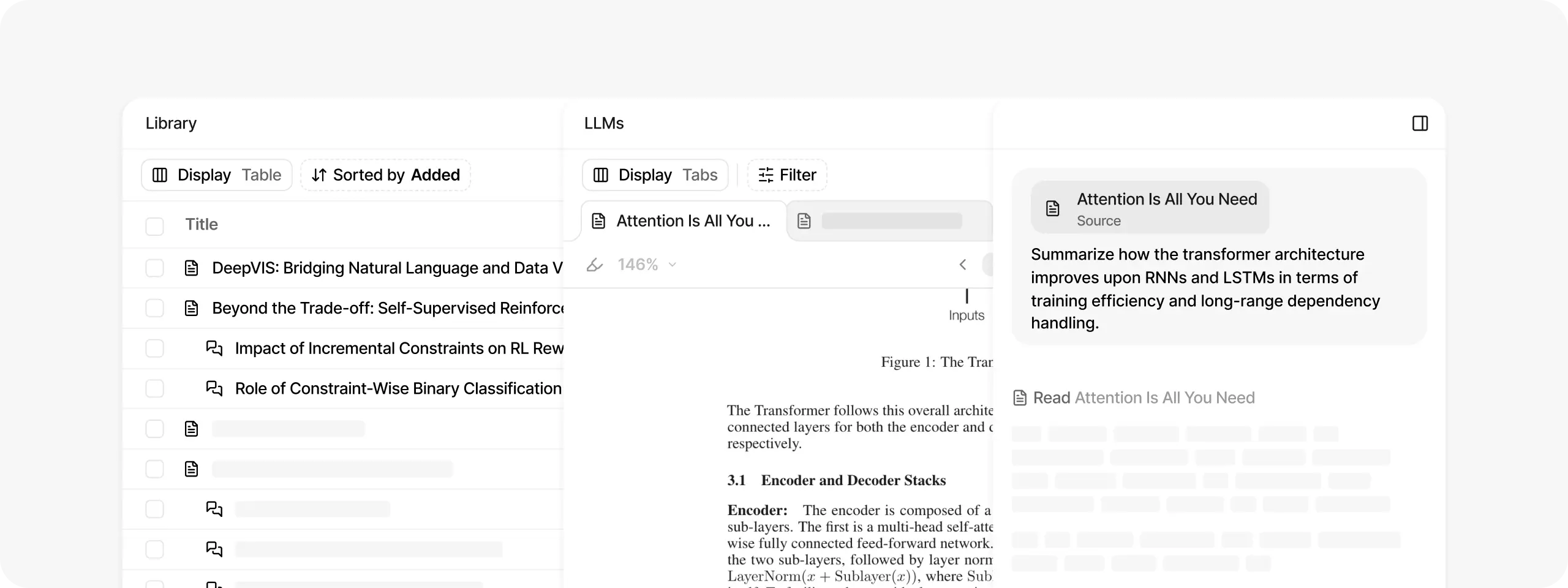How a medical student balances research with clinical rotations using Anara
A medical student with a master's in public health is using Anara to:
- Research cutting-edge glioblastoma treatments while managing clinical rotations
- Navigate complex neuro-oncology literature despite limited specialty background
- Organize multiple research projects with international collaborators
- Overcome language barriers in academic writing
- Conduct systematic reviews and meta-analyses efficiently
- Stay current on immunotherapy-first treatment protocols
When you're a third-year medical student managing hospital rotations, board exam prep, and research deadlines, every minute counts. Add highly specialized brain cancer research to the mix, and traditional research tools become major bottlenecks.
The challenge: mastering neuro-oncology research between surgical rotations
"I have very limited time even to do research. Research is not my principal life and time—it's just extra," explains Sarah, who balances clinical rotations with glioblastoma research collaborations.
Currently investigating narrative reviews on immunotherapy-first approaches for treating brain cancer, Sarah faces unique research constraints:
- Unpredictable hospital schedules: Surgery rotations with grueling, unpredictable hours leave minimal research time
- Specialty expertise gap: Working in neuro-oncology despite limited background in the field
- International collaboration demands: Coordinating with research groups in Cyprus and across Europe
- Academic writing challenges: Crafting professional conclusions in English as a second language
- Literature search complexity: Spending 3-4 hours per session using MeSH terms on PubMed
- Multiple concurrent projects: Managing systematic reviews, meta-analyses, and narrative reviews simultaneously
- Visual organization needs: Previous tools created overwhelming clutter that hindered productivity
The pressure intensifies when researching glioblastoma—tumors so aggressive that extending patient survival from months to 4-5 years represents major progress.
Struggling with similar research demands?
Get Anara freeThe solution: conversational research for time-pressed students
Sarah discovered Anara while seeking alternatives to overwhelming reference managers:
1. Interactive paper analysis
- Ask specific questions instead of reading entire papers
- Get targeted answers about methodologies and outcomes
- Clarify complex terminology in unfamiliar specialties
2. Clean workspace design
- Folder organization by research topic (e.g., "GBM research")
- Minimal visual clutter compared to traditional reference managers
- Immediate visibility into recent work and project status
3. Language and writing support
- Help rephrasing conclusions in professional academic language
- Assistance locating specific information within papers
- Support for non-native English speakers in research writing
4. Flexible content handling
- Import PDFs, links, or any document format
- Works with papers from PubMed, institutional access, or collaborator sharing
- No restrictions on source types or file formats
The workflow: from PubMed complexity to research clarity
Sarah's approach integrates Anara into her existing medical school research process:
Sometimes you're in the corridor waiting to scrub in with just your phone in your pocket—that's all you have. You cannot go sit and focus.
Sarah, Third-Year Medical Student
Her neuro-oncology research workflow:
- Literature discovery: 3-4 hour PubMed sessions using specialized MeSH terms for glioblastoma
- Paper filtering: Eliminate studies based on publication dates, endpoints, and population criteria
- Anara organization: Create project folders and upload relevant papers
- Interactive questioning: Ask targeted questions rather than reading papers sequentially
- Information synthesis: Compare findings across multiple studies efficiently
- Writing refinement: Improve academic language and conclusion clarity
- Google Docs collaboration: Export insights for university-required collaborative platform for writing
See how this workflow could work for your research
Get Anara freeThe immediate impact: research efficiency during demanding rotations
Sarah's experience with Anara transformed her approach to medical research:
Anara really helped me balance my time and make research much easier. I can manage all my different projects without visual clutter
Sarah, Third-Year Medical Student
The platform provided essential benefits for her demanding schedule:
- Mobile research capability: Can review papers and ask questions between surgical cases
- Project compartmentalization: Separate folders prevent overwhelming visual clutter
- Rapid specialty learning: Quickly grasp complex neuro-oncology concepts
- Writing efficiency: Enhanced academic language for non-native English speakers
- Tool simplicity: Intuitive interface eliminates learning curve frustrations
- Collaboration support: Easy sharing with international research partners
- Time multiplication: Manage multiple research types simultaneously
Sarah particularly values the conversational aspect: "I really like the back and forth interaction with Anara. I felt like you have almost like someone is helping you."
Why Sarah chose Anara over alternatives
- Intuitive design: After struggling with Zotero's complexity ("I felt like I didn't know where things are going"), Anara's straightforward approach felt natural
- Conversational interaction: Ability to ask questions of papers rather than just organizing files
- Visual simplicity: Clean interface reduces cognitive load during stressful medical training
- Language assistance: Crucial support for academic writing in second language
- Multi-project management: Handle systematic reviews, meta-analyses, and narrative reviews in one platform
- Mobile optimization: Essential for research during unpredictable hospital schedules
Research in a life-and-death specialty
Sarah's glioblastoma research tackles one of medicine's most challenging areas. These brain tumors remain largely incurable, making her work on immunotherapy-first protocols potentially life-changing for patients.
"It's a very, very niche area. There's little research in the area. The US and UK are actually two of the biggest research centers, but we're expecting more in the next five to ten years."
Her current focus examines giving immunotherapy before surgical resection—a completely new approach that could extend survival for patients facing 4-5 year life expectancies.
The power of accessible research tools
For students managing clinical training alongside research obligations, traditional tools often create more barriers than solutions. Sara'h experience with reference managers reflects common frustrations: complexity that interferes with actual research work.
Anara's conversational approach—treating papers as interactive sources rather than static files—represents a fundamental shift toward research efficiency.
Accessible AI research tools enable meaningful research contributions without sacrificing clinical training quality.
Beyond traditional reference management
Sarah's journey from traditional tools illustrates a broader shift in research workflows. Rather than learning complex software systems, students can focus on the intellectual work of research, such as understanding literature, identifying gaps, and contributing new insights.
Anara's intuitive design accommodates diverse learning styles and professional backgrounds.
